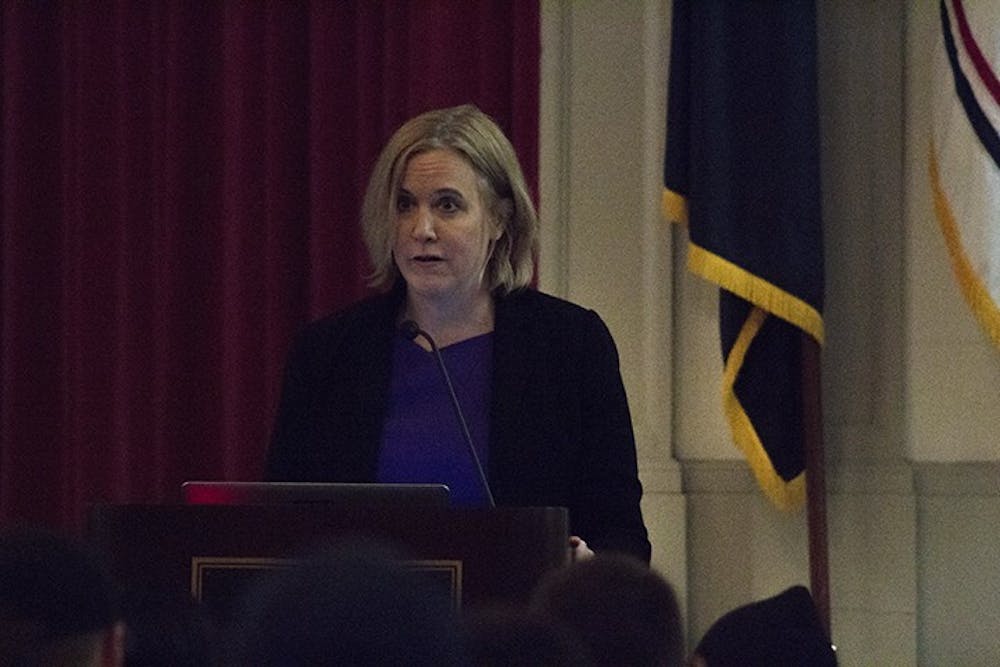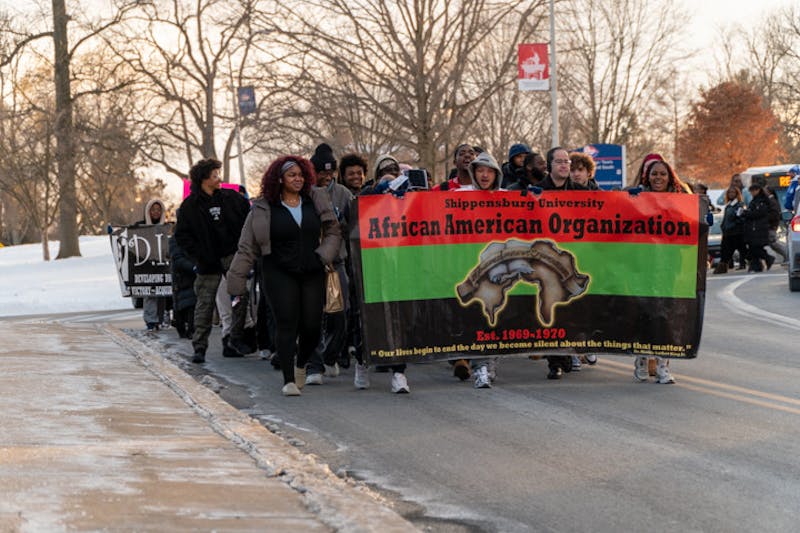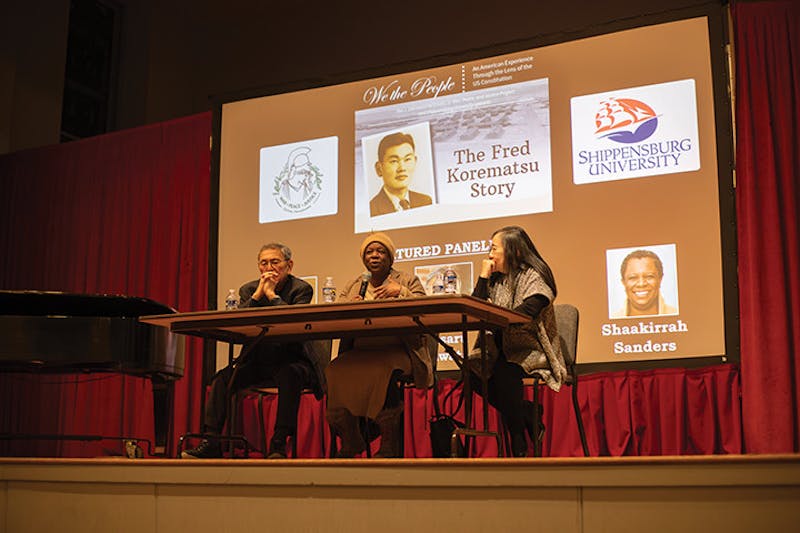There are no ATMs in war zones. Kim Barker learned that the hard way.
Barker, a journalist for more than 20 years, spoke at Shippensburg University on Wednesday night about her experiences in Afghanistan and Pakistan as the South Asia bureau chief for The Chicago Tribune from 2004 to 2009, and the memoir she wrote afterwards — “The Taliban Shuffle: Strange Days in Afghanistan and Pakistan.”
The lecture was sponsored by the SU history and philosophy department, the international studies program and other SU departments.
Barker’s book went on to become the movie “Whiskey Tango Foxtrot” starring Tina Fey in 2016.
“I’m guessing the real reason that the university invited me here tonight is that they thought they were getting Tina Fey,” Barker joked. “But it’s just me, The New York Times reporter played by Tina Fey in the movie.”
On a more serious note, Barker said she felt despair in talking to the audience today as she gave background information on the war in Afghanistan — the longest war in history at 17 years old.
“For almost as long as you have been sanctioned human beings, there has been a war in Afghanistan, and there is no foreseeable way out,” she said.
Barker said Afghanistan was ranked the fourth most corrupt country in the world by Transparency International, and also mentioned 2015 parliamentary elections that still have not been held. A recent suicide attack that killed 57 in Kabul, the capital of Afghanistan, was the country’s fourth attack in a week on the country’s voter registration centers.
Since the beginning of the war, more than 30,000 Afghans have been killed directly in fighting, more than 30,000 other Afghan soldiers and police have been killed in fighting and about 2,400 U.S. troops have been killed, according to Barker.
“To put this at some level of perspective, that’s as if Ship University and Lancaster were wiped off the face of the earth,” she said.
During her presentation, Barker provided the audience with five lessons taken from her experiences in Afghanistan and Pakistan.
1. “Do your research”
Barker said Americans did not know what they were getting into when they went into Afghanistan, nor did they know much about Pakistan and its motivations. She also talked about America’s part in the formation of a strong, central leader in a country that never really knew strong, central leadership.
“Like America, I learned that I didn’t do enough research the hard way. I spoke no foreign languages, I hadn’t even been to Europe. Yet, I volunteered because I wanted to see if I could do it, and I wanted a challenge,” Barker said.
2. “Adapt to the culture”
“You have to do certain things in an Afghan way or you’re not going to get anything you want,” Barker said. She learned that she could not discuss business over food.
Barker talked about meeting warlord Pacha Khan Zadran. When she showed up, she saw men, appearing to be in the military, in mismatched uniforms outside his home, but managed to find humor even in such a scene.
“If I didn’t try to deal with this in an absurd light I’d be pretty much curled up in the corner, crying,” Barker said.
Barker also talked about Pashtun hospitality, and how one could ask for protection and they would grant it, even to enemies.
On the other hand, some lessons she learned went against who she was as a person. Raised as a feminist, Barker found herself in Afghanistan covering up in a burqa, wearing brown contacts to suppress her bright blue eyes. Barker said she found the experience liberating in a way.
“For the first time I felt anonymous, and I felt like I could go anywhere and observe anything,” she said.
3. “Come up with a plan and stick to it”
Barker said America’s foreign policy was largely driven by the military, and its goals were not very clear. She said America never really articulated its plan and what it was trying to accomplish.
Barker said the original goal was to get Al-Qaeda, but then turned into nation-building in Afghanistan.
However, there were not enough NATO troops on the ground to do so. She said the idea changed again to counter-insurgency, and then into counter-terrorism. Barker said things often would go back and forth.
“This really did not endear us to Afghans. Instead of supporting a real democracy, we decide to put all the eggs of our country, so to speak, in the basket of one man, largely a dictator,” Barker said of Hamid Karzai, Afghanistan’s president at the time.
4. “Know how to get out”
“There is a saying in Afghanistan that the Americans have the watches, but the Taliban has the time,” Barker said, discussing Obama’s addition of troops in Afghanistan and his plan to get them out. The combat mission officially ended in December 2014, but as of August 2017, President Donald Trump was discussing raising the number of troops in Afghanistan.
Barker said she had to get out after The Tribune called the correspondents back, but was set to find a way to make people read about the foreign countries that she had come to love and did so through her book.
5. “Have Tina Fey play you in the movie”
Although Barker was joking, she expressed her gratitude for the movie, the success of her book and all of the experiences that changed her life.
“But really, the real last lesson I would say — it’s really difficult to change the world. It’s pretty much impossible. But you can change individual’s lives, and you can let them change you,” Barker said. “I guess there is a last lesson, which is to be grateful. And I know I am.”




The Slate welcomes thoughtful discussion on all of our stories, but please keep comments civil and on-topic. Read our full guidelines here.